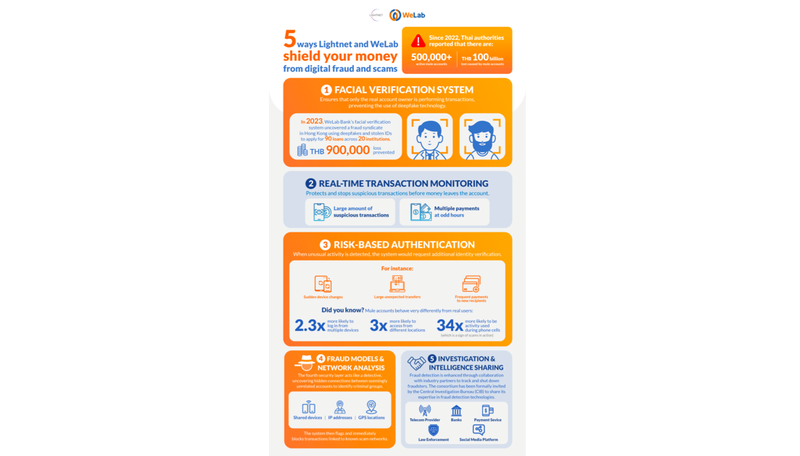
Thailand’s online financial fraud has reached unprecedented levels. Since 2022, the country has faced a staggering scam incidents, with authorities reporting more than 500,000 active "mule accounts" causing losses of 100 billion baht.
These mule accounts or bank accounts being taken over by criminals to launder money through illegal activities have made it difficult for authorities to recover stolen funds and track scams. Account takeover has also emerged as one of the most alarming fraud types in Asia-Pacific, representing a major financial security threat throughout the region.
As threats evolve, innovative solutions rise to meet them. Virtual banks are spearheading bold new tactics to tackle digital fraud, syncing perfectly with Thailand’s push to bolster financial crime defenses through sweeping legislative reforms.
The digital fortress: a multi-layered defense system
Virtual banks are fortified on cloud-native infrastructure to implement security updates while their digital-first design and systems integrate security from the ground up.
Leading this innovation is the Lightnet-WeLab consortium, which has applied for a virtual banking license in Thailand.
Drawing on WeLab's successful virtual banks already operating in Hong Kong and Indonesia and Lightnet’s expertise in advanced cross-border payment infrastructure, the consortium is bringing battle-tested world-class security technologies to protect Thai consumers and businesses from increasingly sophisticated financial fraud and scams.
Leveraging their extensive experience as leading experts in digital banking, the consortium engaged in a valuable exchange of insights on fraud detection with Thailand's Central Investigation Bureau (CIB). This collaborative knowledge sharing marks a significant advancement in the country's stringent efforts to combat financial crime. By sharing knowledge, they aim to enhance anti-fraud technology and strengthen the ongoing fight against evolving fraud tactics.
The consortium follows a five-layered fraud detection framework that works simultaneously to protect users across multiple vulnerable touchpoints. By integrating rule-based filters, advanced machine learning models, and reinforcement learning mechanisms, they've developed a comprehensive defense system that learns and adapts to evolving digital threats.
Key technologies under the 5-layered architecture which combats digital fraud:
1. The guardian gate: strong onboarding verification
Advanced facial recognition systems now detect intricate "deepfakes" when creating an account. When you take a selfie for verification, the system analyzes your photo thoroughly, ensuring you’re not hiding behind a digitally altered photo, video, or background.
In 2023, WeLab Bank's facial verification system detected a deepfake during a loan application in Hong Kong, revealing a fraud syndicate that used eight stolen ID cards to apply for 90 personal loans across 20 financial institutions. Authorities arrested six individuals before they could fully use the HKD 200,000 (approximately 900,000 THB) they had already successfully scammed.
2 .The sentinel system: real-time financial watchdog
The second gate of the security system keeps a watchful eye on real-time transactions. Lightnet and WeLab's real-time monitoring systems flag suspicious activities such as large number of transactions commonly linked to gambling, crypto trading, or payments to multiple accounts during unusual hours. If the account is compromised by fraudsters, the system can immediately suspend an account or stop a transaction. This real-time protection helps catch fraud attempt and stop illegal activities.
3. The adaptive shield: risk-based authentication
The third layer adds extra security checks to ask the user to authenticate themselves upon detecting specific “red flags” like sudden device changes, unusually large transfers, or frequent payments to new recipients—all without disrupting your normal banking experience.
Did you know? Mule accounts have observable patterns that set them apart from legitimate accounts. They're 2.3 times more likely to connect from multiple devices, three times more likely to log in from different locations, and a staggering 34 times more likely to be operating the bank account during phone calls. Mule accounts exhibit a sudden burst of activity, while “hibernating mules” stay dormant for months before suddenly becoming active.
4. The digital detective: connecting the dots with fraud models and network analysis
Like a skilled investigator, this fourth layer spots connections between seemingly unrelated accounts. It can identify criminal groups operating multiple accounts through shared devices, GPS locations, or IP addresses.
In Indonesia, WeLab’s network analysis technology uncovered a fraud operation where multiple accounts shared similar selfie backgrounds, originated from unexpected rural locations, used identical devices, and systematically exploited referral programs through member-get-member channels.
Fraudulent connections among the accounts were flagged by the system, landing them under a watchlist. This prevents accounts from being used as mules for money laundering and other illegal activities like online gambling.
5. The united front: investigation & intelligence sharing
Thailand is strengthening its cybersecurity measures with the government introducing a new emergency decree that requires coordinated action from banks, telecom providers, social media platforms.
The tight-knit collaboration creates a stronger defense network against fraudsters, addressing key vulnerabilities that fraudsters have historically exploited in Thailand's financial system. Collaborative exchanges such as that between the consortium in the private sector and the CIB is just one of many initiatives to bolster a united front.

Lightnet-WeLab consortium’s collaborative exchange with Thailand's Central Investigation Bureau (CIB)
Protection beyond technology: what consumers can do
While advanced technology provides significant protection, individuals must also take steps to prevent fraud:
Protect your banking information and watch for these warning signs: Never allow others to use your bank account and be cautious of requests to share your banking details, ATM cards, and PIN or OTP numbers. Fraudsters are employing advanced manipulation tactics to gain control of bank accounts, targeting vulnerable groups through fake insurance schemes, false tax refund services, or “easy money” account opening schemes.
Double-check before you trust deals that are too good to be true: Scammers use complex techniques to impersonate government officials or offering lucrative deals that are too good to be true. Be cautious and take time to thoroughly research and validate any financial proposition before sharing personal information. Remember, giving up your Personally Identifiable Information (PII) can lead to devastating outcomes such as account takeover or the creation of mule accounts by fraudsters.
Report suspicious activities promptly: If you suspect illegal activities, document all relevant details about the scam, including names, dates, contact methods or any materials you received. Contact your bank's emergency hotline to freeze potentially compromised accounts. For financial crime report, go to the Thai Police online platform (https://thaipoliceonline.com) or contact the national police call center at 1599. Quick and decisive action can prevent financial losses.
As Thailand takes a bold step in strengthening security infrastructure to combat digital financial threats, a combination of strategic legislative measures and advanced defense strategies are needed to enhance consumer protection. Virtual banks, such as the forthcoming virtual bank of Lightnet-WeLab consortium if granted the license, play a crucial role in promoting safe and responsible finance through sophisticated, multi-layered defenses that swiftly adapt to emerging fraudulent activities.
About Lightnet
Lightnet Group, a global fintech leader from Thailand, is committed to advancing technology that enhances accessibility and efficiency, aiming to establish Thailand as a future hub for financial innovation. Licensed by the Bank of Thailand and four other central banks in Asia and Europe, Lightnet Group processes over USD 10 billion annually and offers a wide range of payment solutions in over 150 countries. The company is backed by notable strategic investors, including UOB Venture Management, Seven Bank, Hanwha Investment & Securities, Uni-President, Raffles Family Office.
Lightnet combines local expertise with global experience. Lightnet is founded by Mr. Chatchaval Jiaravanon, known for his roles in AEON Thana Sinsap and Finansia Syrus, brings over 30 years of experience in the financial sector, including international ventures like acquiring Fortune Magazine.
Through its ecosystem partners in various industries, Lightnet has the touchpoints to reach 46 million local customers across both urban and rural areas in Thailand. Lightnet Group focuses on serving unserved and underserved retail and MSME sectors, through over 150,000 local service channels.
For more information, visit lightnet.io or follow us on LinkedIn.
About WeLab
WeLab, a leading pan-Asian fintech platform, operates two digital banks as well as multiple online financial services with leading positions in Hong Kong, Mainland China, and Indonesia, with over 70 million individual users and over 700 enterprise customers. WeLab uses game-changing technology to help customers access credit, save money, and enjoy their financial journey.
Powered by proprietary risk management technology, patented privacy computing techniques, and advanced AI capabilities, WeLab offers mobile-based consumer financing solutions and digital banking services to retail individuals and technology solutions to enterprise customers.
WeLab operates in three markets under several key brands, including WeLend, and WeLab Bank in Hong Kong, various business lines in Mainland China, and Bank Saqu in Indonesia.
WeLab is backed by the most renowned investors including Allianz, China Construction Bank International, International Finance Corporation (a member of the World Bank Group), Malaysian sovereign wealth fund Khazanah Nasional Berhad, CK Hutchison’s TOM Group, and Sequoia Capital.
To learn more, please visit: www.welab.co, or follow WeLab on LinkedIn and Facebook
